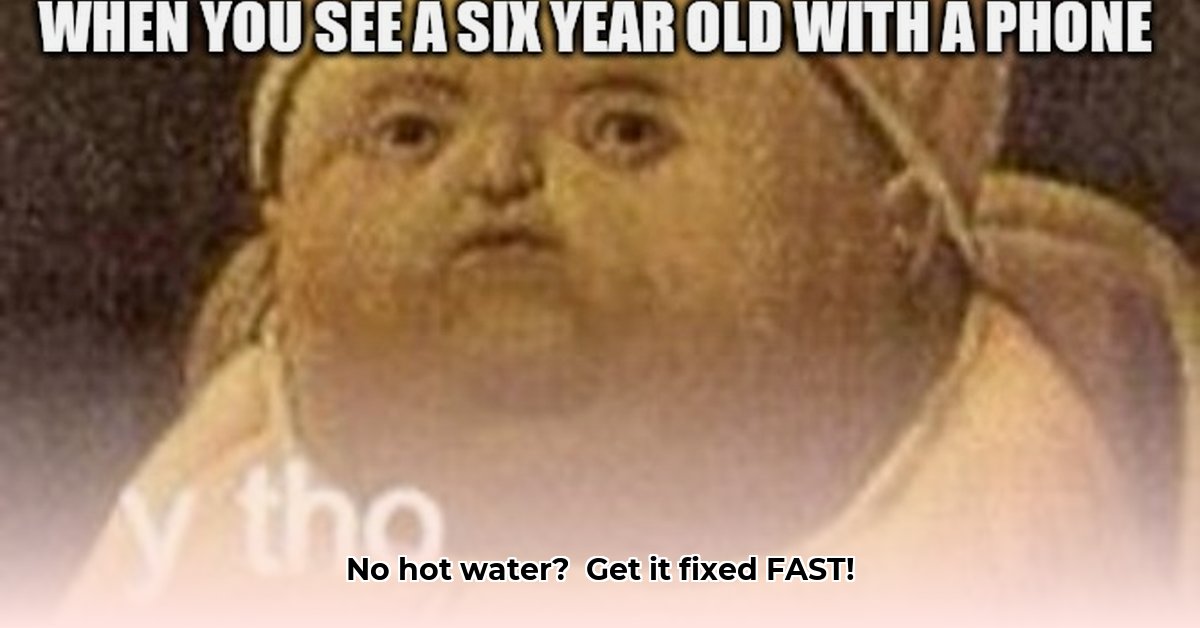Nobody wants to start their day with a freezing shower! A sudden loss of hot water is annoying, but it’s usually fixable. This guide will walk you through figuring out why your hot water’s gone cold and what you can do about it, whether you have a gas or electric water heater. We’ll cover simple things you can check yourself, like the thermostat or breaker box, and also more complicated issues. No matter your DIY skills, we’ll give you clear steps, helpful pictures, and advice on when to call a pro. For more in-depth troubleshooting, check out this helpful guide: hot water solutions. Let’s get that hot water flowing again!
Why Is My Hot Water Not Working? – Common Causes and Quick Checks
So, you’re stepping into the shower, expecting a blissful blast of hot water, and instead, you get a chilly surprise? Brrr! Don’t worry, a lukewarm shower doesn’t have to ruin your day. Let’s track down the problem and get that hot water flowing again. This guide will walk you through some simple checks and common issues, whether you’re a DIY enthusiast or prefer to call a professional plumber for water heater repair. What could be the root cause of your lukewarm shower situation?
Quick Fixes: The Easy Stuff First – Initial assessments
Before diving into the plumbing depths, let’s tackle the simple solutions that might solve your problem in minutes. These initial checks are like a detective’s first steps—easy, quick, and potentially game-changing. What if a simple adjustment is all it takes to restore your hot water supply?
-
Temperature Check: Take a look at your water heater’s thermostat. Is it set correctly? Most water heaters have a dial or digital display to adjust the temperature. The ideal range is typically between 120-140°F (49-60°C). A simple tweak might be all you need to restore the warmth. Think of it as a quick temperature adjustment—like turning up the heat on your oven. Have you checked if your thermostat is within the optimal range for efficient hot water production?
-
Circuit Breaker Check (Electric Water Heaters): If you have an electric water heater, check your electrical panel. Has a circuit breaker flipped? Flipped breakers cut off power to appliances. If you see a tripped breaker (usually indicated by it being in the “off” position), simply reset it by flipping it back to the “on” position. It’s like a power switch for your water heater! Electrical malfunctions can lead to expensive repairs.
-
Pilot Light Check (Gas Water Heaters): Gas water heaters need a consistently burning pilot light. If your pilot light is out, you’ll need to relight it. Consult your water heater’s manual for specific instructions on how to do this safely. Remember, always prioritize safety when dealing with gas. If you’re unsure, call a professional gas technician immediately. This is like re-igniting a tiny flame that’s responsible for your hot water. Gas leaks can be dangerous; always prioritize safety.
Investigating the Problem: Gas Water Heaters – Flame-related Issues
Gas water heaters are a bit more complex than their electric counterparts. If the preliminary checks yielded nothing, let’s delve a bit deeper. Think of this as moving from the superficial to the more intricate parts. A faulty thermocouple, for instance, can cause a major disruption.
-
Pilot Light Problems: A flickering or non-existent pilot light is a common suspect. If you’re struggling to keep the pilot light lit, the thermocouple (a small heat-sensing device) might be faulty. Unless you have experience working with gas appliances, it’s best to call a qualified gas technician for this one. Attempting this yourself could be unsafe. Think of the thermocouple as the tiny safety guard that keeps things under control. A faulty thermocouple can cause your pilot light to go out.
-
Gas Supply Troubles: A blocked gas line leading to your water heater can prevent gas from reaching the burner, resulting in no hot water. If you suspect a gas leak, call a qualified gas technician immediately! Gas leaks are dangerous and should be handled only by experts. Think of this as a potential hazard that needs a pro’s touch. The national average cost to repair a gas leak is around $350.
-
Thermocouple Trouble: The thermocouple acts as a safety mechanism, ensuring that the gas flow stops if the pilot light goes out. A malfunctioning thermocouple can interrupt the gas supply, leading to cold showers. Again, for thermocouple issues, it’s best to seek the help of a professional. They have the expertise and tools to safely handle the repair.
Troubleshooting: Electric Water Heaters – Heating element problems
Electric water heaters generally present simpler troubleshooting opportunities than gas heaters, but always prioritize safety when working with electricity. According to the U.S. Fire Administration, electrical malfunctions cause approximately 24,000 residential fires each year.
-
Heating Element Failure: Electric water heaters utilize one or two heating elements to warm up the water. Over time, these elements can burn out, leading to a lack of hot water. If you’re uncomfortable working with electrical components, it’s strongly recommended to call in an electrician for this repair. This is akin to replacing a lightbulb, but with a higher voltage. Safety first! What is the lifespan of your water heater’s heating elements?
-
Upper and Lower Heating Elements: Many electric water heaters have two heating elements – one near the top and another near the bottom of the tank. If only part of your water is getting heated, you might have a faulty element. This is another situation where professional help is often a safer bet.
-
Thermostat Issues: A malfunctioning thermostat will prevent the heating elements from turning on, resulting in cold showers. While replacing a thermostat is often considered a DIY-friendly task, if you lack electrical experience, it’s best to call an electrician. This is similar to replacing a simple component but involves electricity—better to be safe than sorry.
When to Call the Pros: Recognizing When You Need Help – Professional assistance
Don’t hesitate to contact a licensed plumber or electrician if: When should you admit defeat and call in a professional for your hot water woes?
-
You detect a gas leak. This is a serious safety concern that demands immediate professional attention.
-
You’re uneasy working with electricity. Electrical work can be dangerous if not handled correctly.
-
Simple troubleshooting steps haven’t resolved the issue. Sometimes, the problem lies beyond the realm of basic DIY solutions.
-
You notice unusual circumstances, like strange noises emanating from your water heater or leaks around it. These could indicate a more severe problem.
Preventative Care: Avoiding Future Hot Water Headaches – DIY maintenance
Regular maintenance is key to preventing many hot water woes. Think of it as a check-up for your water heater. Did you know that regular maintenance can extend your water heater’s lifespan by several years?
| Task | Frequency | Benefits |
|---|---|---|
| Flush the tank | Annually | Removes sediment buildup, improving efficiency and extending lifespan. |
| Inspect anode rod | Annually | The anode rod protects the tank from corrosion; replacing it helps prolong its life. |
| Check for leaks | Regularly | Early detection helps prevent costly repairs. |
| Check thermostat | Periodically | Ensures the water is heated to the appropriate temperature for safety and efficiency. |
Remember, safety is paramount. If you’re ever unsure about any step, it’s better to err on the side of caution and call a professional. A quick fix now can prevent a much bigger—and costlier—problem later.
How to Troubleshoot a Gas Water Heater Thermocouple Problem – Troubleshooting pilot light issues
Key Takeaways:
- A faulty thermocouple can prevent your gas water heater from igniting or staying lit.
- Getting to the root of how to troubleshoot a gas water heater thermocouple problem often starts with simple checks, like the gas supply and pilot light.
- A multimeter can test the thermocouple for proper voltage output.
- Cleaning the thermocouple might solve minor issues.
- Replacement is usually necessary for a completely malfunctioning thermocouple.
- If you’re unsure, always call a qualified gas technician.
What role does the thermocouple play in gas water heater operation?
Understanding the Thermocouple’s Role – Function and importance
Your gas water heater uses a thermocouple—a small, temperature-sensitive device—for safety. It senses the pilot light’s flame. If the flame goes out, the thermocouple cools, shutting off the gas supply. Think of it as a crucial safety switch. Without a working thermocouple, your hot water could be interrupted, and more importantly, you risk a dangerous gas leak. Without a functioning thermocouple, the gas supply could be interrupted.
Is Your Thermocouple the Culprit? Common Signs – Faulty component symptoms
Before diving into how to troubleshoot a gas water heater thermocouple problem, let’s identify if it’s even the issue. Are you experiencing these issues with your gas water heater?
- Pilot light won’t stay lit. This is the most common sign.
- Inconsistent hot water. The water is sometimes hot, sometimes lukewarm, or completely cold.
- Clicking or popping sounds from the water heater. These suggest ignition problems.
*
- How to Stop Apps From Running in the Background to Boost Your - December 1, 2025
- How To Move Apps On Your Droid For Better Organization - November 30, 2025
- How to Move Apps on Android for Better Organization - November 29, 2025










